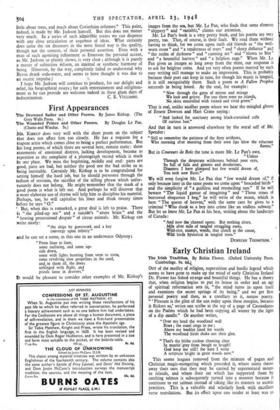First Appearances
The Drowned Sailor and Other Poems. By James Kirkup. (The Grey Walls Press. 6s.) The Wounded Prince and Other Poems. By Douglas Le Pan. (Chatto and Windus. 5s.)
MR. KIRKUP does very well with the short poem on the subject that does not affect him too closely. He has a requiem for a trapeze artist which comes close to being a perfect performance. But his long poems, of which there are several here, remain static: these statements of emotional distress, lacking development, become as repetitive as the complaint of a phonograph record which is stuck In one place. We miss the beginning, middle and end: parts are good, parts are bad, but neither the good nor the bad strike us as being inevitable. Certainly Mr. Kirkup is to be congratulated for setting himself the hard job, but he should persevere through the tedium of revision, the sacrifice of the telling phrase which unfor- tunately does not belong. He might remember that the mark of a good poem is what is left out. And perhaps he will discover that a more elaborate use of rhyme will help him to discipline his material. Perhaps, too, he will capitalise his lines and think twenty times before he says "0."
° But, when this is remarked, a great deal is left to praise. There is " the piled-up sea " and a suicide's "azure brain " and the " heaving processional despair " of circus animals. Mr. Kirkup can write nicely:
" the ships by guesswork and a key converge upon infinity" and he can set a scene, as this one in an underwater Odyssey:
" From liner to liner, some reclining, and some up- side down,
some with lights burning from stem to stern,
some revolving slow propellers in the sand, and in them all, the doors
unhinged with flight, and
pistols loose in drawers."
lIt would be pleasant to consider other examples of Mr. Kirkup's images from the sea, but Mr. Le Pan, who finds that same element " slippery " and " variable," claims our attention.
Mr. Le Pan's book is a very pretty book, and his poems are very pretty, too. That, of course, is their fault. We read them without having to think, for we come upon such old friends as " the well- worn stone " and " a tenderness of tears " and " sharp defiance" and " the realm of darkness " and "cunning art " and " blown to bits" and "a bountiful harvest" and " a helpless rage." When Mr. Le Pan gives us images so long away from the mint, our response is to ask for brighter coins. And yet very often poems marred by such easy writing still manage to make an impression. This is probably because their poet can keep in tune, for though his music is languid, it is still recognisably there. Such a poem as A Fallen Prophet succeeds in being heard. At the end, for example: "Now through the gates of mirror and mirage
We look and grieve. For you there were no islands, No ,skies enscrolled with veined and vivid green."
That is real, unlike another poem where we hear the mingled ghosts of Ernest Dowson and Hart Crane saying:
"And looked for sanctuary among black-curtained cells Of curious lust."
And that in turn is answered elsewhere by the astral self of Mr. Spender : " Still to remember the patience of the fiery artificers, Who morning after morning from their own lips blew the reluctant
flames."
But in Coureurs de Bois the tone is more Mr. Le Pan's own.
" Unless
Through the desperate wilderness behind your eyes,
So full of falls and glooms and desolations, Disasters I have glimpsed but few would dream of, You "seek new Easts."
We will even forgive Mr. Le Pan that " few would dream of," if only because later in the same poem we come upon " brocaded birds " and the simplicity of " a guiltless and reconciling sun." If he will beware "The liquid gamut of imagining " and " Those tones of borrowed eloquence I beg," he will write of the moon, which is here "The queen of heaven," with the same care he gives to a criminal "Who slunk as a boy into crime like an endless subway." But let us leave Mr. Le Pan at his best, writing about the landscape of Canada: " And now the channel opens. But nothing alters. Mile after mile of tangled struggling roots, Wild-rice, stumps, weeds, that clutch at the canoe, Wild birds hysterical in tangled trees."
DUNSTAN THOMPSON.


































 Previous page
Previous page